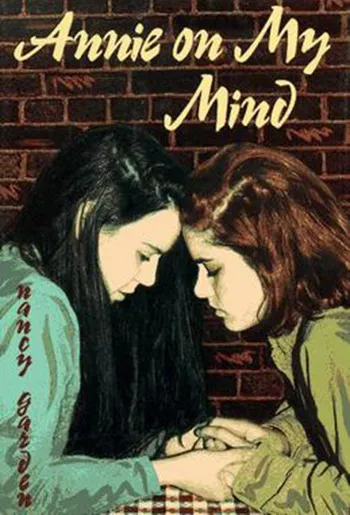
ANNIE ON MY MIND
Nancy Garden
© 1992 Nancy Garden
$11.99
272 pages
Content warning: Homophobia
Annie on My Mind was publicly burned by Christian evangelists in Kansas City – which is a ragingly good review for a book if I've ever heard one. It's sweet, it's cute, it's an utterly milquetoast story about two teens falling in love – and it's #44 on the list of the most banned books in the US.
In summary, Liza is a high school senior, class president, and an aspiring architect who meets Annie, a senior from a different school, at a museum. They play goofy jokes on each other, have picnics, and steal some of their parents' wine. When two teachers go on a holiday together, they cat-sit for them and make out. Another teacher, Ms. Baxter, barges in upon hearing that two teenage girls are spending the night together. Because they're both underdressed (even though it's the middle of the night), Ms. Baxter declares them to be committing crimes against God and demands that the school expel Liza. Sher also demands that the school send a letter to MIT, where Liza has been accepted, that would tell them Liza is a Lesbian. It's the 1980s, so everyone goes along with it. The school calls a special hearing, Liza's parents are advised to get an attorney, and Liza has to declare exactly how far her tongue went down Annie's throat to a board of middle-aged trustees.
Thankfully, at this point, one of the trustees declares the whole thing absurd and dismisses Liza and her parents. Unfortunately, the teachers who Liza and Annie had been cat-sitting for are fired for sharing one bed and being a "bad" (Queer) influence on the students.
The ending is, thankfully, happy. Written in 1982, it's the first Gay YA ending that is.
Liza is at college and at first can't bear to respond to Annie's letters, but after a few months decides to call her. They reconcile and arrange to go home over Christmas break together. The two teachers are fired, but Annie and Liza go to see them one last time. The teachers say that they're happily retiring to the countryside to paint and garden (just like the protagonists in Patience and Sarah, one of their Sapphic bedside books).
What Annie on My Mind captures so accurately is the goofiness of young, reckless love. The two leads play-act in a museum, pretend to be various Arthurian characters, and grow to feel comfortable being ridiculous around each other. It's also – for all the other Queer books from this period and even contemporarily – surprisingly funny. A girl in Liza's class, Zelda, after finding out about Liza and Annie, very seriously asks Liza's opinion on this very important question (since she plans to be a doctor): what do two women actually do in bed?
It also very carefully balances the prickly space of Liza's liberal parents. They don't hate homosexuals per se; Liza's mom quickly assures her that she, too, had feelings for a girl and kissed a bit – but nothing happened. It was just a phase. Liza's father, although he says it shouldn't matter what people do on their own time, defends the teachers' firing, and that he thought he accepted homosexuality – until it was his own daughter who was one. He also tells her that he'll accept her, but being Gay is just so much harder. She'd be so much happier with a husband and a family. And he wants her to be happy, that's all.
It's a sweet, cute book about a sweet, cute love story. The most remarkable thing about it is that it is remarkable. That it was burned, that it was banned, that people frothed at the mouth at two girls living their lives. That's what I appreciated most about it: the reminder that the cost of something like this, a tiny piece of tender normalcy, can be so dear.
There is one part of Annie on My Mind that I'm particularly reminded of, and that's The Dictionary Moment. It's happened here and in countless of the other Lesbian canon books: the time when a questioning Queer asks, "Is this a thing I can be? Have other people felt like this? Are there others like me?" So, pre-Google, pre-internet, they turn to that old reliable: motherfucking Merriam-Webster. So I would like to shout out to that underappreciated M&W duo, affirming Queer existence since 1909.

